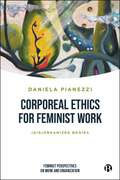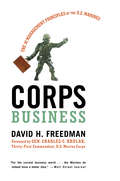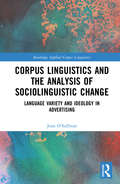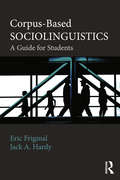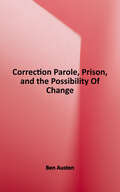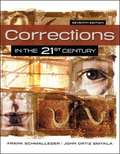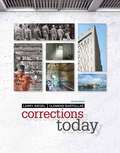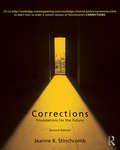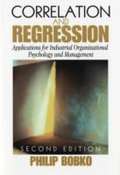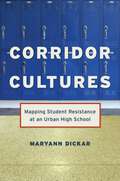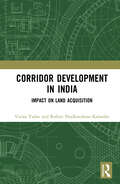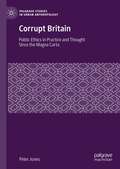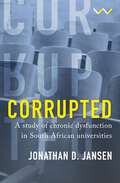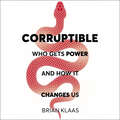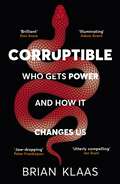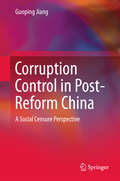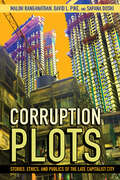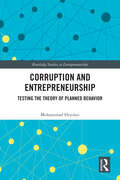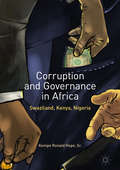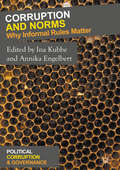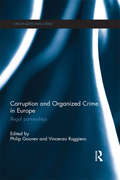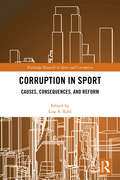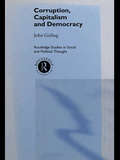- Table View
- List View
Corporatizing Rural Education: Neoliberal Globalization and Reaction in the United States (New Frontiers in Education, Culture, and Politics)
by Jason A. CervoneThis book presents a critical analysis of the anti-democratic and pro-authoritarian ideologies that exist in rural communities in the United States. The author book also explores and recontextualizes existing research in rural education within this anti-democratic framework, as well as theorizing the consequences of this ideology as it takes place in the rural United States, specifically in regards to the physical and ideological shaping of rural communities to meet the needs of capitalist accumulation. Finally, it discusses the ways rural youth can reclaim the public sphere within their communities through critical education.
Corporeal Ethics for Feminist Work: (Dis)organized Bodies (Feminist Perspectives on Work and Organization)
by Daniela PianezziWhat does it mean to be a feminist? What can feminism say about ourselves, the work we do, and our ways of living together? This book draws on the work of Fraser, Butler, and Braidotti to examine how societal and organizational processes shape and are shaped by our perception of work, value, and identity. Disrupting the long-established mind–body dualism, the book reveals its impact on our understanding of value, raising critical questions about how different forms of feminism influence work practices and recognition. With a foreword by Luigi Maria Sicca and an afterword by Melissa Tyler, this is a unique and insightful analysis that sparks critical reflection, offering a foundation for corporeal ethics to drive meaningful change in organizations and society.
Corps Business
by David H. FreedmanFast. Motivated. Hard-hitting. That's what every business wants to be. And that's why the U.S. Marines excel in every mission American throws at them, no matter how tough the odds. In Corps Business, journalist David H. Freeman identifies the Marine's simple but devastatingly effective principles for managing people and resources -- and ultimately winning. Freedman discusses such techniques as "the rule of three," "managing by end state," and the "70% solution," to show how they can be applied to business solutions.
Corps Business
by David H. FreedmanFast. Motivated. Hard-hitting.That's what every business wants to be. And that's why the U.S. Marines excel in every mission American throws at them, no matter how tough the odds. In Corps Business, journalist David H. Freeman identifies the Marine's simple but devastatingly effective principles for managing people and resources -- and ultimately winning. Freedman discusses such techniques as "the rule of three," "managing by end state," and the "70% solution," to show how they can be applied to business solutions.
Corpus Linguistics and the Analysis of Sociolinguistic Change: Language Variety and Ideology in Advertising (Routledge Applied Corpus Linguistics)
by Joan O'SullivanCorpus Linguistics and the Analysis of Sociolinguistic Change demonstrates how particular styles and varieties of language are chosen and represented in the media, to reveal changing language ideologies and sociolinguistic change. Drawing on a corpus of ads broadcast on an Irish radio station between 1977 and 2017, this book shows how corpus linguistic tools can be creatively employed, in conjunction with frameworks and concepts such as audience and referee design and indexicality, and examines how accents and dialects (vernacular and prestige) are exploited in the ads across the decades. In addition, this book: illustrates the key principles of corpus design for sociolinguistics studies and offers a framework for future diachronic corpus studies of advertising on social media; provides a model for analysing corpus data at both inter-varietal and intra-varietal levels in terms of both accent and dialectal features and explores the efficacy of using particular corpus linguistic tools; identifies key factors which can be used by researchers as evidence for sociolinguistic change and links these factors to relevant theories and frameworks; demonstrates how corpus tools can be used to compare advertising discourse with naturally occurring discourse, with particular reference to markers of (pseudo) intimate discourse. Building on the growing body of research relating to variation and change in Irish English, this book is key reading for researchers and advanced students undertaking research within the areas of sociolinguistics and corpus linguistics.
Corpus-Based Sociolinguistics: A Guide for Students
by Eric Friginal Jack HardyIn the last decade, the availability of corpora and the technological advancements of corpus tools have increased dramatically. Applied linguists have greater access to data from around the world and in a variety of languages through websites, blogs, and social networking sites, and there is a high level of interest among these scholars in applying corpora and corpus-based methods to other research areas, particularly sociolinguistics. This innovative guidebook presents a systematic, in-depth account of using corpora in sociolinguistics. It introduces and expands the application of corpora and corpus approaches and tools in sociolinguistic research, surveys the growing number of studies in corpus-based sociolinguistics, and provides instructions and options for designing and developing corpus-based studies. Readers will find practical information on such contemporary topics as workplace registers, megacorpora, and using the web as a corpus. Vignettes, case studies, discussion questions, and activities throughout further enhance students’ involvement with the material and provide opportunities for hands-on practice of the methods discussed. Corpus-Based Sociolinguistics is a comprehensive and accessible guide, a must-read for any student or scholar interested in exploring this popular and promising approach to sociolinguistic research.
Correction: Parole, Prison, and the Possibility of Change
by Ben AustenNYT Editor's Choice - Washington Post Best Nonfiction of 2023 - From The Critically Acclaimed Author of High-Risers comes a groundbreaking and honest investigation into the crisis of the American criminal justice system through the lens of parole. The United States, alone, locks up a quarter of the world's incarcerated people. And yet apart from clichés--paying a debt to society; you do the crime, you do the time--there is little sense collectively in America what constitutes retribution or atonement. We don't actually know why we punish. <p><p>Ben Austen's powerful exploration offers a behind-the-scenes look at the process of parole. Told through the portraits of two men imprisoned for murder, and the parole board that holds their freedom in the balance, Austen's unflinching storytelling forces us to reckon with some of the most profound questions underlying the country's values around crime and punishment. What must someone who commits a terrible act do to get a second chance? What does incarceration seek to accomplish? <p><p>An illuminating work of narrative nonfiction, Correction challenges us to consider for ourselves why and who we punish-and how we might find a way out of an era of mass imprisonment.
Corrections In The 21st Century
by Frank Schmalleger John Ortiz SmyklaCorrections in the 21st Century uses a practical approach to introduce students to the ideas and practices characteristic of modern corrections while equipping them with the skills necessary to succeed in the field. Its approach to corrections includes a thorough description of correctional ideology, a comprehensive overview of correctional practice, and the development of personal skills applicable to the corrections field.
Corrections Today
by Larry J. SiegelGet a frontline look at the field of corrections with CORRECTIONS TODAY, 4th Edition. This briefer, visual, paperback alternative to hardback Introduction to Corrections texts is ideal for readers who are interested in real-world concepts and applications. It examines the field of corrections through the lens of students -- perhaps like you -- who are giving serious thought to a career in the field or are working in corrections while seeking an advanced degree in order to be promoted or switch job paths. Updated with new professional profiles and insightful coverage of restorative justice, special offender populations, the use of private prisons, and many other timely topics, the fourth edition offers a practical, engaging, career-focused, and authoritative introduction to corrections.
Corrections: Foundations for the Future (Criminology and Justice Studies)
by Jeanne B. Stinchcomb"Jeanne Stinchcomb's book makes an excellent contribution to the field of corrections serving as a substantial resource for those teaching corrections and as a practical inspiration for those students who will ultimately lead the profession. Stinchomb carefully crafts a balanced perspective that presents a powerful argument for why corrections is an important and necessary part of our criminal justice system while at the same time cautioning that justice can only be served when corrections is implemented with integrity and held to the highest of professional standards....This book will dare those who care about corrections to move beyond the ease of accepting the status quo to optimistically embracing the greater challenges of implementing a just and effective system of corrections." - Faith E. Lutze, Ph.D., Washington State University Written by a master teacher with over a decade of experience in federal, state, and local justice agencies, this is the most comprehensive, yet affordable, corrections text on the market. Students will like everything about it - from the reasonable cost to the user-friendly narrative that keeps them engaged. Chapters are written with the passion of a former correctional trainer and administrator, while balancing both sides of every issue. Based on proven concepts of instructional design, the narrative features: measurable learning outcomes that are placed strategically throughout the chapters material is presented in a "building-block" method designed to enhance learning "Close-up on Corrections" boxes reinforce content with real-life stories and examples. Realistic insights are provided into virtually every aspect of the "correctional conglomerate" - from the impact of sentencing policies to the effects of institutional life and the difficulties of re-entry. Unlike most other texts, an entire chapter is devoted to the correctional workforce - which gives students insights into the challenges as well as rewards of such employment. Best of all for the instructor, the book's flexibility and supplemental material make it a breeze to use in the classroom. Electronic versions are available for online and hybrid courses, and it is customizable in inexpensive paperback form. The instructor's manual, written entirely by the Author of the text itself, includes over 500 high-quality test questions directly correlated with each learning outcome featured in the text, along with annotated websites, teaching tips, and powerpoint slides.
Correlation and Regression: Applications For Industrial Organizational Psychology and Management (Second Edition)
by Philip Bobko"This book provides one of the clearest treatments of correlations and regression of any statistics book I have seen. . . . Bobko has achieved his objective of making the topics of correlation and regression accessible to students. . . . For someone looking for a very clearly written treatment of applied correlation and regression, this book would be an excellent choice. " --Paul E. Spector, University of South Florida "As a quantitative methods instructor, I have reviewed and used many statistical textbooks. This textbook and approach is one of the very best when it comes to user-friendliness, approachability, clarity, and practical utility. " --Steven G. Rogelberg, Bowling Green State University
Corridor Cultures: Mapping Student Resistance at an Urban School (Qualitative Studies in Psychology #15)
by Maryann DickarFor many students, the classroom is not the central focus of school. The school's corridors and doorways are areas largely given over to student control, and it is here that they negotiate their cultural identities and status among their peer groups. The flavor of this “corridor culture” tends to reflect the values and culture of the surrounding community.Based on participant observation in a racially segregated high school in New York City, Corridor Cultures examines the ways in which school spaces are culturally produced, offering insight into how urban students engage their schooling. Focusing on the tension between the student-dominated halls and the teacher-dominated classrooms and drawing on insights from critical geographers and anthropology, it provides new perspectives on the complex relationships between Black students and schools to better explain the persistence of urban school failure and to imagine ways of resolving the contradictions that undermine the educational prospects of too many of the nations' children.Dickar explores competing discourses about who students are, what the purpose of schooling should be, and what knowledge is valuable as they become spatialized in daily school life. This spatial analysis calls attention to the contradictions inherent in official school discourses and those generated by students and teachers more locally.By examining the form and substance of student/school engagement, Corridor Cultures argues for a more nuanced and broader framework that reads multiple forms of resistance and recognizes the ways students themselves are conflicted about schooling.
Corridor Development in India: Impact on Land Acquisition
by Vinita Yadav Rohini Neelkanthrao KalambeThis book discusses the nuances of corridor development in India and its implications on land acquisition and displacement. It explores the complexities of land related conflicts and its socio-economic impacts on people’s lives. Examining the evolution of a few corridors of national importance like the Mumbai-Nagpur Expressway, Yamuna Expressway, Delhi-Mumbai Industrial Corridor, and Pune-Mumbai Expressway, the volume provides a comprehensive understanding of the dynamics of corridor development and regional growth. The book discusses how policies relating to land acquisition result in political, economic, legal and psychological hardships. The authors, using primary and secondary data, assess the socio-economic implications of land-acquisition on agriculture, employment, environment, demography, and land utilization along the regions touching these corridors. The work further discusses sustainable interventions in land acquisition practices to ensure equity of land and resources for vulnerable communities. The book will be useful for students and researchers of public policy, development studies, economics, urban and regional development studies and sociology. It will also be of interest to academicians, regional planners, and those working in the field of land development, resettlement and rehabilitation.
Corrupt Britain: Public Ethics in Practice and Thought Since the Magna Carta (Palgrave Studies in Urban Anthropology)
by Peter JonesThis book deploys a long-term account of political corruption in Britain to explain the phenomenon of corruption as it resides within the state and the contemporary problem of corruption denial among members of the political class. It aims to satisfy the concern about corruption and identify potential causes and significance. The book provides and account of definitions of corruption and how those definitions have changed over time. Throughout the succeeding chapters it discusses public life and how ethical considerations for public office holders have evolved over time. This book argues that corruption is not just a concern about politics and understanding corruption requires a multi-disciplinary approach: history; political science; sociology; anthropology and urban ethnography.
Corrupted: A study of chronic dysfunction in South African universities
by Jonathan D JansenIn South African higher education, the images of dysfunction are everywhere. Student protests. Violence. Police presence. Rubber or real bullets. Class disruptions. Burning tyres. Damaged buildings. Injury and sometimes death. Reports of wholesale corruption. Year after year, often in the same set of universities; the problem of routine instability seems insoluble.The financial, academic and reputational costs of ongoing dysfunction are high, especially for those universities caught-up in the never-ending struggle to overcome apartheid legacies. Any number of explanations have been ventured, including a lack of resources, shortage of capacity, rural location, corrupt officials, and endemic conflict. Corrupted takes a deeper look at dysfunction in an attempt to unravel the root causes in a sample of South African universities.At the heart of the problem lies the vexed issue of resources or, more pertinently, the relationship between resources and power: who gets what, and why? Whatever else it aspires to be—commonly, a place of teaching, learning, research and public duty—a university in an impoverished community is also a rich concentration of resources around which corrupt staff, students and those outside of campus all vie for access.Taking a political economic approach, Jonathan Jansen describes the daily struggle for institutional resources and offers accessible, sensible insights. He argues that the problem won’t be solved through investments in ‘capacity building’ alone because the combination of institutional capacity and institutional integrity contributes to serial instability in universities. Rather, durable solutions would include the depoliticisation of university councils and appointments of academics with integrity and capacity to manage and lead these fragile institutions.This groundbreaking and long overdue study will offer a promising way forward for universities to better serve their communities and the country more broadly.
Corruptible: Who Gets Power and How it Changes Us
by Dr Brian KlaasDoes power corrupt, or are corrupt people drawn to power? Are entrepreneurs who embezzle and cops who kill the outgrowths of bad systems or are they just bad people? Are tyrants made or born? If you were thrust into a position of power, would new temptations to line your pockets or torture your enemies gnaw away at you until you gave in?To answer these questions, Corruptible draws on over 500 interviews with some of the world's noblest and dirtiest leaders, from presidents and philanthropists to rebels, cultists, and dictators. It also makes use of a wealth of counter-intuitive examples from history and social science: You'll meet the worst bioterrorist in American history, hit the slopes with a ski instructor who once ruled Iraq, have breakfast with the yogurt kingpin of Madagascar, learn what bees and wasps can teach us about corruption, find out why our Stone Age brains cause us to choose bad leaders, and learn why the inability of chimpanzees to play baseball is central to the development of human hierarchies.Corruptible will make you challenge basic assumptions about how you can rise to become a leader and what might happen to your head when you get there. It also provides a roadmap to avoiding classic temptations, suggesting a series of reforms that would ensure that better people get into power, while ensuring that power purifies rather than corrupts.'ILLUMINATING' - Adam Grant, bestselling author of Think Again 'PASSIONATE, INSIGHTFUL, AND OCCASIONLLY JAW-DROPPING' - Peter Frankopan, bestselling author of The Silk Roads(P) 2021 Hodder & Stoughton Limited
Corruptible: Who Gets Power and How it Changes Us
by Dr Brian Klaas'Illuminating . . . reveals why some people and systems are more likely to be corrupted by power than others' - Adam Grant'Passionate, insightful, and occasionally jaw-dropping . . . Corruptible sets out the story of the intoxicating lure of power-and how it has shaped the modern world' - Peter Frankopan'A brilliant exploration' - Dan Snow'Klaas is the rarest of finds: a political scientist who can also tell great stories. He mixes memorable anecdotes with stern analysis to tackle one of the biggest questions of all: do we have to be ruled by bad people?' - Peter PomerantsevDoes power corrupt or are corrupt people drawn to power?Are tyrants the products of bad systems or are they just bad people?And why do we give power to awful people?In Corruptible, professor of global politics Brian Klaas draws on over 500 interviews with some of the world's top leaders - from the noblest to the dirtiest - including presidents, war criminals, cult leaders, terrorists, psychopaths, and dictators to reveal the most surprising workings of power: how children can predict who is going to win an election based just on the faces of politicians; why narcissists make more money; what makes a certain species of bee more corrupt than others; whether a thirst for power is a genetic condition; and why being the second in command is in fact the smartest choice. From scans of psychopathic brains, to the effects of power on monkey drug use, Klaas weaves cutting-edge research with astonishing encounters (including a ski lesson with the former viceroy of Iraq, tea with a former UK prime minister, and breakfast with Madagascar's yogurt kingpin president). Written by the creator of the award-winning Power Corrupts podcast, Corruptible challenges our basic assumptions about power, from the board room to the war room, and provides a roadmap for getting better leaders at every level.
Corruption Control in Post-Reform China: A Social Censure Perspective
by Guoping JiangThe book examines corruption control in post-reform China. Contrary to the normal perception that corruption is a type of behavior that violates the law, the author seeks to approach the issue from a social censure perspective, where corruption is regarded as a form of social censure intended to maintain the hegemony of the ruling bloc. Such an approach integrates societal structure, political goals, and agency into a single framework to explain dynamics in corruption control. With both qualitative data from officials in power and officials in jail and quantitative data from university students, the book explores how the censure on corruption was created and has been applied from 1978 to the present. Though primarily intended for academics, the book is also accessible for general audiences, especially given its intriguing perspective and use of firsthand data on corruption that cannot be found anywhere else.
Corruption Plots: Stories, Ethics, and Publics of the Late Capitalist City (Cornell Series on Land: New Perspectives on Territory, Development, and Environment)
by David L. Pike Sapana Doshi Malini RanganathanCorruption Plots illuminates how corruption is fundamental to global storytelling about how states and elites abuse entrusted power in late capitalism. The millennial city of the global South is a charged setting for allegations of corruption, with skyscrapers, land grabs, and slum evictions invoking outrage at deepening economic polarization. Drawing on ethnography in Bengaluru and Mumbai and a cross-section of literary and cinematic stories from cities around the world, Malini Ranganathan, David L. Pike, and Sapana Doshi pay close attention to the racial, caste, class, and gender locations of the narrators, spaces, and publics imagined to be harmed by corruption. Corruption Plots demonstrates how corruption talk is leveraged to make sense of unequal spatial change and used opportunistically by those who are themselves implicated in wrongdoing. Offering a wide-ranging analysis of urban worlds, the authors reveal the ethical, spatial, and political stakes of storytelling and how vital it is to examine the corruption plot in all its contradictions.
Corruption and Entrepreneurship: Testing the Theory of Planned Behavior (Routledge Studies in Entrepreneurship)
by Mohammad HeydariThis book examines corruption as a collective behavior problem for entrepreneurs. In particular, it considers Azjen’s theory of planned behavior (TPB) to explain perceived corruption and its effects on entrepreneurship.Heydari argues that behavioral intentions are shaped by variables such as attitude, subjective norms and perceived behavioral control. He proposes the novel Heydari Behavioral Synthesis Theory (HBST) model and applies it to two case studies to highlight the institutional, individual and societal factors that may inhibit entrepreneurial behavior. He concludes that corruption may persist not just because of difficulties in monitoring and prosecuting, but because it is systemically pervasive and discourages individual countermeasures. He closes by looking at anti-corruption policies and outlining future research directions.Arguing that widespread corruption may be theoretically mischaracterized in the literature, this book is of interest to policy-makers, researchers and postgraduate students in the fields of management science, industrial and organizational psychology, entrepreneurship and corruption studies.
Corruption and Governance in Africa: Swaziland, Kenya, Nigeria
by Kempe Ronald HopeThis volume analyzes the corruption phenomenon in Africa and how to combat it from a governance perspective with illustrated case studies from three of the most corrupt of those nations covering, respectively, the Southern Africa region (Swaziland); the Eastern Africa region (Kenya); and the Western Africa region (Nigeria). Drawing on the available data, research literature, and field practice experience, the nature and extent of corruption are identified; the factors influencing the causes and determining the consequences of corruption are delineated; measures that have been put in place to control corruption are outlined and discussed; and new policy solutions are proposed and advocated to more effectively control the corruption menace in Africa.
Corruption and Norms: Why Informal Rules Matter (Political Corruption and Governance)
by Ina Kubbe Annika EngelbertThis book focuses on the role of norms in the description, explanation, prediction and combat of corruption. It conceives corruption as a ubiquitous problem, constructed by specific traditions, values, norms and institutions. The chapters concentrate on the relationship between corruption and social as well as legal norms, providing comparative perspectives from different academic disciplines, theoretical and methodological backgrounds, and various country-studies. Due to the nature of social norms that are embedded in personal, local, and organizational contexts, the contributions in the volume focus in particular on the individual and institutional level of analysis (micro and meso-mechanisms). The book will be of interest to students and scholars across the fields of political science, public administration, socio-legal studies and psychology.
Corruption and Organized Crime in Europe: Illegal partnerships (Organizational Crime)
by Vincenzo Ruggiero Philip GounevIn Corruption and Organised Crime in Europe, Gounev and Ruggiero present a discussion of the relation between organized criminals and corruption in the EU’s 27 Member States. The book draws on research and scholarly work the editors carried out, respectively, within the Center for the Study of Democracy (CSD) in Bulgaria, and within academic institutions, as well as on behalf of the European Commission and the United Nations. Combining empirical data and theoretical debates, the book focuses on three main areas of the relationship between corruption and organised crime: public bodies, the private sector and criminal markets. It presents the findings of a recent research project carried out by the CSD on behalf of the European Commission, providing an analysis of the specific national contexts in which corruption and organized crime thrive. The essays also address institutional responses and policies, focusing particularly on how EU Member States attempt to sever the links between the official economy, the political sphere and organized crime. The second part of the book presents case studies, written by some of the foremost international experts on the subject matter, analysing corrupt exchange and criminal organisations, concentrating on specific European countries – Bulgaria, France, Greece, Italy, Russia, Spain and the UK. As the first comprehensive study of corruption and organised crime in the countries of the European Union, the book will be a valuable resource for students and scholars of criminology, sociology, law and international politics, as well policy makers and law-enforcement agencies.
Corruption in Sport: Causes, Consequences, and Reform (Routledge Research in Sport and Corruption)
by Lisa A. KihlCorruption in the sport industry is a pervasive issue that threatens the integrity of sport as an institution. From doping and match-fixing to money laundering, corruption should be a concern to anybody interested in sport policy, management, governance, or ethics. This is the first book to explore the complexity of sport corruption in terms of its conceptualisation, causes, consequences, and reform. The first part looks at the concept of sport corruption, while the second examines the causes of sport corruption from individual, organisational, industry-wide, and longitudinal viewpoints. The third part discussed is the consequences of sport corruption and its impact on the global sport industry. Various approaches to regulatory reform are considered in the next part, as well as the challenges of combatting corruption in the sport industry. The final part assesses the current state of literature in this area and suggests opportunities for future research. Drawing on multidisciplinary case studies from across the world, this is a seminal contribution to the academic study of corruption in sport. It is important reading for all students and scholars of sport management, business, criminology, and law.
Corruption, Capitalism and Democracy (Routledge Studies in Social and Political Thought #Vol. 4)
by John GirlingCorruption arises from the collusion of economic and political elites, a practice that has developed in order to overcome the contradiction of two important processes of our time: capitalism and democracy. In this new study of the phenomenon, the author shows how corruption is the practice of collusion taken to excess; 'the unacceptable face of capitalism'. Corruption, by 'going too far', exposes what is normally hidden from view; the collusive system of elites furthering the expansion of capitalist practice and market practice at the expense of democratic practice and public values.

